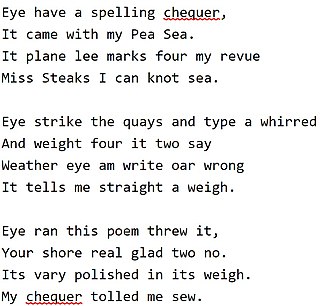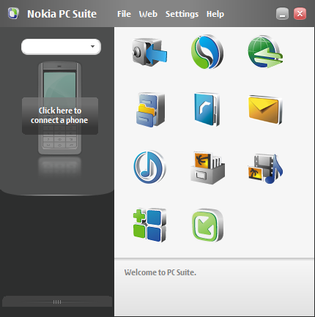| Final release | 3.0 |
|---|---|
| Written in | C++ |
| Operating system | Cross-platform |
| Type | Spell checker |
| License | Open source |
| Website | code |
MySpell is a free spell checker, written to explore how affix compression could be implemented.
It used to be included with the OpenOffice.org office suite and Mozilla client software, and was replaced with the more powerful Hunspell library between 2006 and 2008. [1] [2]
MySpell license is based on the 2-clause BSD license, but has an additional clause requiring to explicitly mark any modified versions.
MySpell was started by Kevin Hendricks in an attempt to integrate various open-source spelling checkers into the OpenOffice.org build. With a little prodding from Kevin Atkinson, the author of Pspell and Aspell, a new spelling checker (MySpell) was written in C++ that supported affix compression, based on Ispell.[ citation needed ]
Every locale (language for a specific territory) can have files for spelling, hyphenation and a thesaurus. These files will be all found together in one folder. The spell checking is done using the .aff file for the locale together with the .dic file. The .dic file is a list of words along with a group of letters which refer to the affixes found in the .aff file. This saves space because instead of having to include all forms of a word, like jump (jumping, jumps, jumped), the .dic file will include the word once and the references to the affixes in the .aff file allow the construction of all the other forms.
It is not enough to copy the files for a locale into the folder. As there are multiple locales, automatic loading of all dictionaries would cause a considerable overhead. Hence, only those locales listed in dictionary.lst are accessible. Dictionary.lst can be edited with a simple text editor, but front ends provide a more user-friendly way of adding new locales.
MySpell also is or has been used by other programs:
Aspell and Vim 7 can now use a dictionary created for MySpell.[ citation needed ]
Spelling is a set of conventions for written language regarding how graphemes should correspond to the sounds of spoken language. Spelling is one of the elements of orthography, and highly standardized spelling is a prescriptive element.
Cabinet is an archive-file format for Microsoft Windows that supports lossless data compression and embedded digital certificates used for maintaining archive integrity. Cabinet files have .cab filename extensions and are recognized by their first four bytes MSCF. Cabinet files were known originally as Diamond files.

A checkbox is a graphical widget that allows the user to make a binary choice, i.e. a choice between one of two possible mutually exclusive options. For example, the user may have to answer 'yes' (checked) or 'no' on a simple yes/no question.

In software, a spell checker is a software feature that checks for misspellings in a text. Spell-checking features are often embedded in software or services, such as a word processor, email client, electronic dictionary, or search engine.
GNU Aspell, usually called just Aspell, is a free software spell checker designed to replace Ispell. It is the standard spell checker for the GNU operating system. It also compiles for other Unix-like operating systems and Windows. The main program is licensed under the GNU Lesser General Public License, the documentation under the GNU Free Documentation License. Dictionaries for it are available for about 70 languages. The primary maintainer is Kevin Atkinson.

Ispell is a spelling checker for Unix that supports most Western languages. It offers several interfaces, including a programmatic interface for use by editors such as Emacs. Unlike GNU Aspell, ispell will only suggest corrections that are based on a Damerau–Levenshtein distance of 1; it will not attempt to guess more distant corrections based on English pronunciation rules.
Pspell is a program meant to provide a generic interface to the system spelling checking libraries. It was, and sometimes still is, used in computer programming such as C, and is licensed under the GNU Lesser General Public License.
The following tables compare general and technical features of notable email client programs.
This article provides basic comparisons for notable text editors. More feature details for text editors are available from the Category of text editor features and from the individual products' articles. This article may not be up-to-date or necessarily all-inclusive.
Hunspell is a spell checker and morphological analyser designed for languages with rich morphology and complex word compounding and character encoding, originally designed for the Hungarian language.
Enchant is a free software project developed as part of the AbiWord word processor with the aim of unifying access to the various existing spell-checker software. Enchant wraps a common set of functionality present in a variety of existing products/libraries, and exposes a stable API/ABI for doing so. Where a library doesn't implement some specific functionality, Enchant will emulate it.

Nokia PC Suite is a discontinued software package used to establish an interface between Nokia mobile devices and computers that run the Microsoft Windows operating system. Its first release was in 1997, originally called Nokia Data Suite. It was replaced by Nokia Suite and integrated into the Ovi service suite.

OmegaT is a computer-assisted translation tool written in the Java programming language. It is free software originally developed by Keith Godfrey in 2000, and is currently developed by a team led by Aaron Madlon-Kay.
Windows Resource Protection is a feature first introduced in Windows Vista and Windows Server 2008. It is available in all subsequent Windows operating systems, and replaces Windows File Protection. Windows Resource Protection prevents the replacement of critical system files, registry keys and folders. Protecting these resources prevents system crashes. The way it protects resources differs entirely from the method used by Windows File Protection.
In computing, ".bak" is a filename extension commonly used to signify a backup copy of a file.
OpenTaal is a Dutch foundation which provides free Dutch language files to be used in open-source software spell checking, hyphenation, thesaurus and grammar checking.
Virastyar is a Persian add-in for Microsoft Word that performs Persian spell checking, character standardization, Pinglish transliteration, punctuation correction and calendar conversion. It can conjugate approximately 46,000 simple verb tense, and use inflection and morphological rules to recognize possible extensions of a word. It covers approximately 2,800 non-verbal inflections for nouns, adjectives, adverbs, prepositions, numerals, classifiers, and pronouns.
LibreOffice Writer is the free and open-source word processor and desktop publishing component of the LibreOffice software package and is a fork of OpenOffice.org Writer. Writer is a word processor similar to Microsoft Word and Corel's WordPerfect with many similar features, and file format compatibility.
spell is the standard English language spell checker for Unix, Plan 9, and Unix-like operating systems.
Brotli is a lossless data compression algorithm developed by Google. It uses a combination of the general-purpose LZ77 lossless compression algorithm, Huffman coding and 2nd-order context modelling. Brotli is primarily used by web servers and content delivery networks to compress HTTP content, making internet websites load faster. A successor to gzip, it is supported by all major web browsers and has become increasingly popular, as it provides better compression than gzip.